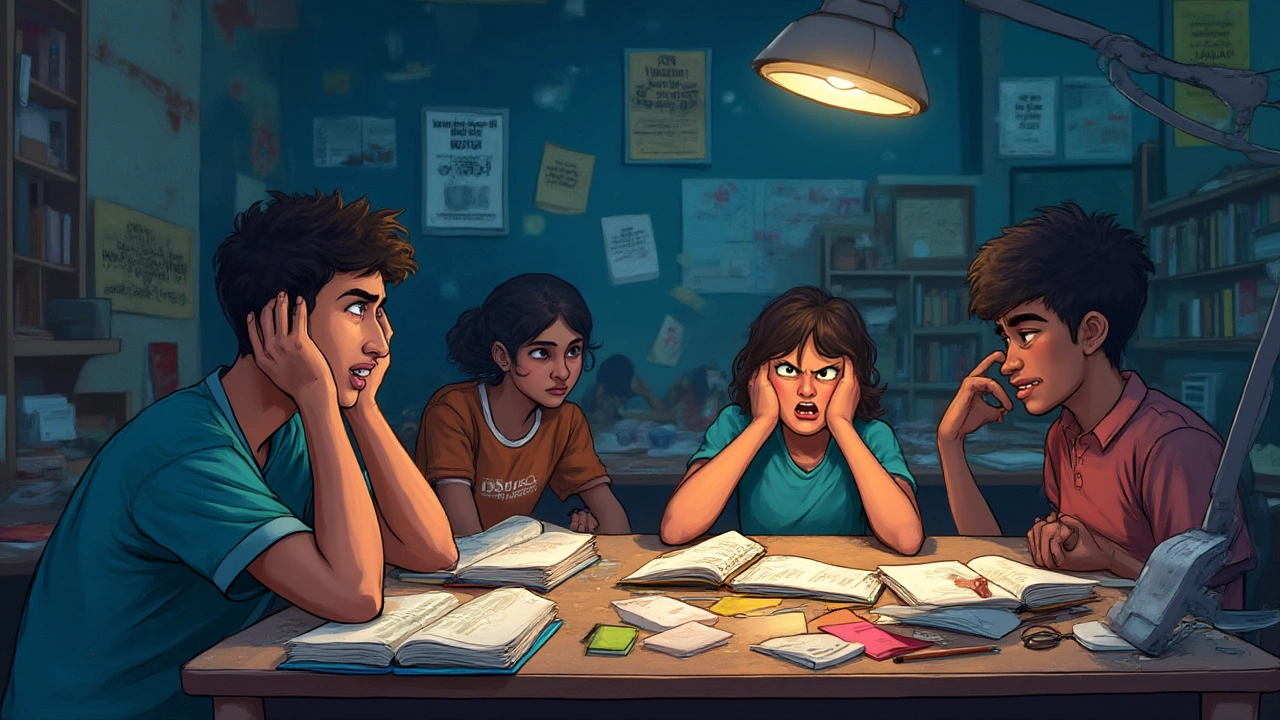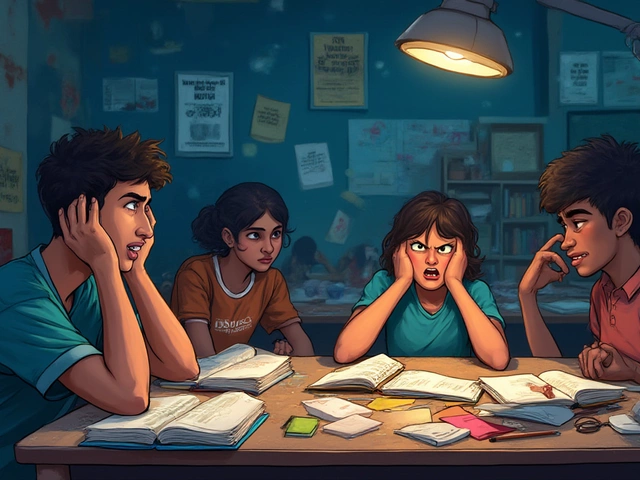Picture this: it’s 3 AM, your coffee’s gone cold, your friends are sleeping, and you’re still staring at a research paper that’s only half done. For a lot of college students, this isn’t rare—it’s just another Tuesday. The internet loves to argue about which degree is the “most stressful,” but it’s more than just urban legend or memes about engineering students never seeing the sun. The truth? Some degrees are scientifically and statistically tougher and come with higher emotional, mental, and even physical costs. But sorting out which degree claims the top stress spot isn’t as straightforward as it sounds.
The Stress Scale: What Makes a Degree Stressful?
Let’s break down what we really mean by “stressful.” It’s not just about who gets the lowest sleep or who drinks the most coffee—though those are basically requirements for some majors. Stress in university comes from a brutal combination of relentless deadlines, insane workloads, competitive classmates, unclear expectations, and the pressure to keep grades high enough for scholarships or grad school. Add to that: lectures that feel like they’re in a foreign language, students hustling for internships in their “spare time,” and the lurking threat of everyone else seeming smarter or more prepared.
You can actually measure it: studies from institutions like the American College Health Association regularly rank majors by reported stress and burnout levels. The highest-stress fields almost always include medicine, engineering, architecture, law, and certain science majors—like chemistry or physics. These degrees demand long hours in labs or studios, constant assessments, and a ton of material to memorize or master. The University of Cambridge, for example, reported that medical students faced nearly double the average rate of psychological distress compared to other degrees. And engineering? I have a cousin who cannot hear the word "thermodynamics" without twitching.
But it’s not just what you study—it’s how colleges teach it. Some courses have weekly deadlines with zero room for error. Others use "weed out" classes designed to knock out anyone less than 100% committed, ratcheting up anxiety. Factors beyond the classroom also play a role: financial stress, juggling part-time jobs, or feeling pressure from home to succeed all turn up the heat.
The "Winners": Degrees That Top the Stress Charts
So which degrees actually rank as the most stressful? Medicine usually takes the cake. The commitment is legendary: pre-med classes known for destroying GPAs, a brutal selection process for medical school, then grueling years of study with 60+ hour weeks during clerkships. A 2024 survey by Stanford showed over 45% of med students reported "severe" stress symptoms. It’s not just exams—the emotional toll of working with patients, death, and huge responsibility makes it extra intense.
Engineering is a close second. Whether it’s civil, mechanical, or computer science, engineering degrees feature a relentless workload. Labs, group projects, multiple problem sets per week, and pressure to land competitive internships—all while teachers seem to invent new ways to make exams trickier. According to The Washington Post, engineering majors average more homework hours per week than any other field, often cramming in over 20 hours outside class. And if you’ve ever met a “sleep-deprived engineering student” meme, you know it’s not exaggerated.
Architecture is another monster. It’s famous for its “studio culture,” which basically means students pull all-nighters bending over scale models, digital renderings, and pages of sketches. The culture demands perfection and creativity at the same time. Architecture students reportedly have the lowest average amount of sleep per night. Some say, “In architecture, you don’t finish the project, you just run out of time.”
Law deserves a mention, especially in places like India, US, and UK, where first-year law (that dreaded “1L” year) is a haze of case studies, high-pressure oral arguments, and reading assignments the length of small novels. It’s not just hard work—it’s the expectation of perfection.
Don’t forget the pure sciences—chemistry, biochemistry, physics, and mathematics majors push students to absorb huge swathes of theory with minimal margin for error. One mistake can wreck a lab report or exam. Research from the Journal of College Science Teaching revealed that chemistry students report high levels of "chronic academic stress," even higher than many pre-med students.
But here’s the curveball: stress isn’t just about the "reputation" of your degree. For kids like mine, Ruhi and Vihaan, picking a college course in the next few years won’t just be about which field is “the hardest,” but which one is the hardest for them. For some, public speaking is actual torture, for others, a big spreadsheet sends a shiver down their spine. Personality matters almost as much as subject.

Hidden Stress: When the Toughest Degrees Aren’t What You Expect
Here’s something school counselors rarely mention at career days—some supposedly “easier” majors are actually real stress cauldrons. Fine arts, design, literature, and social sciences can also be demanding in sneaky ways. Take creative degrees like animation or film studies: students juggle huge projects, face constant criticism, and often have to hustle for work on the side just to stay afloat. Subjectivity—never really knowing if your work will be graded as “brilliant” or “boring”—creates a different kind of pressure.
Education and nursing are two fields people sometimes overlook. Turns out, student teachers and trainee nurses spend many hours on placements, working odd shifts, and get emotionally invested in the wellbeing of their students or patients. Heavy responsibility, low pay during training, and lots of bureaucracy turn up the internal temperature here, too.
It’s not just what or how much you study, but also the environment. High-pressure, competitive programs—like elite business or MBA programs—can push even the most confident students into stress spirals. One of my friends from b-school calls the degree “an 18-month firehose to the face.” Competition for jobs, networking, and constant FOMO (fear of missing out) make sleep a luxury.
Some students struggle because of mismatched interests, a lack of support, or cultural pressure. There’s no denying that family and social expectations can rack up hidden stress, especially in big fields like engineering or medicine, where failing out is seen as a family disaster.
Stress Effects: When the Degree Costs More Than Just Tuition
The toll from a stressful degree isn’t just about grades or job prospects, though those keep students awake at night. Academic stress messes with your mind and body. High-stress degree programs have some of the highest rates of anxiety, depression, sleep disorders, and even physical illness among students, according to a recent report by the World Health Organization.
When the pressure gets extreme, things break down. Med students, for example, face such high burnout rates that some universities now offer mandatory mental health check-ins. Engineering majors lose track of healthy eating and exercise because of their study routine. Architecture students, famous for “studio all-nighters,” sometimes end up quitting their dreams for the sake of sanity. It’s not just the students—it runs in families too. I remember nights when Ruhi had her first batch of school exams and asked if "college is just this but with more pressure." Honestly? Sometimes yes.
Some stress is healthy—it teaches resilience, time management, grit. But toxic stress, day after day, can leave scars. Sleep deprivation leads to memory problems. Constant comparison triggers imposter syndrome. For a lot of students, it’s not just about getting through exams, but getting through each day without a meltdown.
Add in today’s realities—rising tuition, side hustles to pay for life, digital distractions, and pandemic aftershocks—and you see how today’s students really are up against more stress than ever. In the US, for example, a 2023 study from the National College Health Assessment said over 60% of college students experienced "overwhelming anxiety" in the last year. That number jumps in med, law, and engineering.

Surviving and Thriving: Tips for Managing a Stressful Degree
The million-dollar question—how does anyone make it out of a high-stress degree with their brain (and sense of humor) intact? First off, recognizing stress is normal helps. You’re not alone, even if it feels like everyone else “gets it” except you.
Time management is the obvious but critical answer. Top students use planners, digital calendars, and sometimes old-school sticky notes for reminders. They chunk tasks down, prioritize what must be done now vs. what can wait, and never underestimate the magic of a 10-minute break. If you’re pulling all-nighters every week, you’re not “hustling”—you’re setting yourself up to crash.
Support networks matter more than most people admit. Whether it’s a study buddy who keeps you accountable, a senior who shares past exam papers, or a WhatsApp group where everyone rants about the latest pop quiz, finding your tribe saves your sanity. My son Vihaan once asked me, “How do you make friends in a new class?” I told him the secret: just find the ones who are lost as you are—the rest follows.
Don’t forget what you love. Even in the hardest degrees, squeezing in something you genuinely enjoy—sports, music, a Netflix binge, or just a lazy walk—gives your mind a breath. It sounds cheesy, but seeing the bigger picture matters. You’re not just your grades or GPA. University is about learning, mistakes, and life’s first taste of chaos.
Some of the most resilient students bounce back by seeing stress as a signal, not a state. When things get overwhelming, they talk to professors, counselors, or mental health professionals. Most universities now have wellness centers or apps that let you reach out without the awkward “knock on the door” experience.
Final tip—even the most “impossible” degree is a marathon, not a sprint. If you have to take a break, switch timelines, or change majors, that’s not failure, it’s self-preservation. The hardest degree is only worth it if it leads you somewhere you want to go—not just somewhere you’re expected to be.

